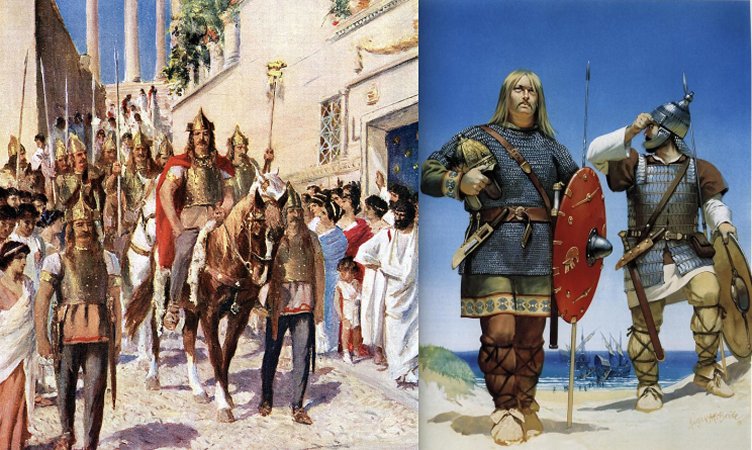Who Were The Goths And Where Did They Come From?
David Tee - AncientPages.com - There is a difference between the terms Visigoths and Ostrogoths.
The former word means western Goths and the latter means eastern Goths, but the Goths themselves rarely referred to themselves in this manner. Their beginnings, like most ancient civilizations, is lost to history.
Left: An illustration of Alaric entering Athens in 395. Credit: Public Domain - Right: Ancient warriors. Source
Some argue that the Goths originated in Scandinavia. Others claim the Goths were from Poland or some Germanic heritage. Herodotus made a connection between the Goths and the Scythians, but that identification may or may not be valid.
The people were often associated with barbaric practices and the term barbarian applied to anyone who didn’t speak Greek. Yet even with this wild reputation, somehow the Goths were able to influence the art and architecture worlds, including modern subculture. Their Gothic style was depicted as dark ad romantic.
The Goth’s Rise To Fame And Power
Tacitus spoke of the Goths as Germanic and a united people who were fierce fighters. Yet caution is given as Tacitus wrote about them in the 1st century AD and the majority of accounts come hundreds of years later. The people Tacitus wrote about may not be the same Goths of the 4th and 5th centuries AD.
Most of the Goth’s fame came after they started battling with the Romans. Not much is known about them prior to those conflicts. Their own runic language has few extant examples thus a complete history of the Goths is unobtainable.
Like the Persians before them, the Goths attacked Greece in the 3rd Century AD at the pass of Thermopylae but the outcome is not known. The recorded text ends before the victor could be identified. Decius, a Roman Emperor, suffered the loss of men and territory in the Greek wars with the Goths.
A love-hate relationship with Rome began somewhere in the 3rd r 4th centuries. The Goths would attack certain cities under Roman control, yet they would also serve as soldiers in the Roman legions. The two nations also traded with each other.
The Goths And The Huns
Even though they had a complicated relationship with the Romans, the Goths still had other enemies looking for their land. One of those enemies were the Huns. The Huns pushed the Goths territorially towards the Romans. The Romans did not like the Goths and subjugated them to humiliating treatment.
Gothic invasions in the 3rd century. Credit: Public Domain
The bad treatment finally broke the Goths and they rebelled against the Romans in the Balkans. Emperor Valens and his army were killed by the Goths at the battle of Adrianople in 378 AD. His successor, Theodosius, made a peace pact with the Goths that lasted until 395 AD.
Alaric came to the Gothic throne just as the Western Roman Empire was coming apart and weakening. Taking advantage of the rebellions by other factions in Gaul and Britain. Alaric decided to lay a siege on Rome itself.
He was motivated by a failed earlier attempt to invade Italy and the massacre of Goths in the Eastern Roman Empire. Bolstered by runaway slaves and supporters of Stilicho, a Roman general killed by Honorius, Alaric and his army attacked Rome in 410 AD.
Sadly, for Alaric, he died shortly after conquering Rome.
The End Of The Goths
Prior to Alaric’s victory, the Goths did divide themselves. One group of Goths were friendly to Rome and willingly adapted to the Roman lifestyle. Led by Fritigin, the one faction became Christians under the Arian banner.
The other faction remained more or less pagan and were led by a staunch anti-Romist Athanaric. The two factions went to battle with Athanaric winning the war. The defeat helped push Fritigin closer to the Romans and it helped lead to a guerilla type war between Athanric and the Romans.
This type of warfare would have been won by the Goths if it had not been for the intervention of Attila the Hun and his army. The Huns destroyed the Goths food supply forcing Athanric to make a treaty with Rome.
Even with this intervention, some of the Goths allied themselves with the Huns and continued to battle Rome. But as history showed, that whenever the Goths got a successful foothold, someone was always there to take it away from them.
After the 2nd Gothic War, the Goths disappeared from history.
Written by – David Tee AncientPages.com Staff Writer
Copyright © AncientPages.com All rights reserved. This material may not be published, broadcast, rewritten or redistributed in whole or part without the express written permission of AncientPages.com
Expand for referencesMore From Ancient Pages
-
 Dangerous Anomaly Inside Mysterious European Mountain Remains Unexplained – Examining Evidence – Part 2
Ancient Mysteries | Mar 17, 2021
Dangerous Anomaly Inside Mysterious European Mountain Remains Unexplained – Examining Evidence – Part 2
Ancient Mysteries | Mar 17, 2021 -
 Mysterious Kola Pyramids Built By An Unknown Lost Ancient Civilization Can Rewrite Ancient History
Civilizations | Aug 3, 2020
Mysterious Kola Pyramids Built By An Unknown Lost Ancient Civilization Can Rewrite Ancient History
Civilizations | Aug 3, 2020 -
 On This Day In History: Vespasian Was Elected The Roman Emperor – On July 1, 69 A.D.
News | Jul 1, 2016
On This Day In History: Vespasian Was Elected The Roman Emperor – On July 1, 69 A.D.
News | Jul 1, 2016 -
 Extraordinary Discovery: Clay Vessel With Sour Soup For The Gods Found In Medieval Hut
Archaeology | Jun 4, 2017
Extraordinary Discovery: Clay Vessel With Sour Soup For The Gods Found In Medieval Hut
Archaeology | Jun 4, 2017 -
 Frigg: Chief Norse Goddess Who Knew Secrets Of Humans’ Fates
Featured Stories | Dec 13, 2022
Frigg: Chief Norse Goddess Who Knew Secrets Of Humans’ Fates
Featured Stories | Dec 13, 2022 -
 Does The Shigir Idol Depict Demons And Evil Spirits?
Archaeology | May 3, 2018
Does The Shigir Idol Depict Demons And Evil Spirits?
Archaeology | May 3, 2018 -
 Study Of Environmental Conditions Of Early Humans In Europe And The Out-Of-Africa Migration
Archaeology | Sep 8, 2021
Study Of Environmental Conditions Of Early Humans In Europe And The Out-Of-Africa Migration
Archaeology | Sep 8, 2021 -
 Ancient Human Traces Found In The Inhospitable Namib Desert
Human Beginnings | Oct 21, 2024
Ancient Human Traces Found In The Inhospitable Namib Desert
Human Beginnings | Oct 21, 2024 -
 Sculpture Of Lord Vishnu Dated To The Early 9th Century Found In Kashmir
Archaeology | Aug 4, 2022
Sculpture Of Lord Vishnu Dated To The Early 9th Century Found In Kashmir
Archaeology | Aug 4, 2022 -
 Curious Ritual Wooden ‘Duho’ Stool Of Ancient Taino People
Ancient Traditions And Customs | Sep 12, 2017
Curious Ritual Wooden ‘Duho’ Stool Of Ancient Taino People
Ancient Traditions And Customs | Sep 12, 2017 -
 Mysterious Deaths Around Empress Cixi – Cruel Tyrant Or Victim Of Propaganda?
Featured Stories | Apr 9, 2018
Mysterious Deaths Around Empress Cixi – Cruel Tyrant Or Victim Of Propaganda?
Featured Stories | Apr 9, 2018 -
 Sensational Find: Huge Cuneiform Archive Of Mysterious Ancient Clay Tablets Discovered In Iraq
Archaeology | Oct 26, 2017
Sensational Find: Huge Cuneiform Archive Of Mysterious Ancient Clay Tablets Discovered In Iraq
Archaeology | Oct 26, 2017 -
 Did An Extraterrestrial Spacecraft Land In Ancient China? Remarkable UFO Accounts From The Past
Ancient Mysteries | Nov 17, 2014
Did An Extraterrestrial Spacecraft Land In Ancient China? Remarkable UFO Accounts From The Past
Ancient Mysteries | Nov 17, 2014 -
 Mongol Empire: Rise And Fall Of One The World’s Largest And Fearsome Empires
Featured Stories | Mar 26, 2021
Mongol Empire: Rise And Fall Of One The World’s Largest And Fearsome Empires
Featured Stories | Mar 26, 2021 -
 Ancient History Of Chinese Swords
Featured Stories | Aug 20, 2018
Ancient History Of Chinese Swords
Featured Stories | Aug 20, 2018 -
 Historical Document Confirms Martyrdom Of Japanese Christian Retainers 400 Years Ago
News | Feb 26, 2021
Historical Document Confirms Martyrdom Of Japanese Christian Retainers 400 Years Ago
News | Feb 26, 2021 -
 Genetic Links Between Traits Are Often Overstated – UCLA Study
Archaeology | Nov 28, 2022
Genetic Links Between Traits Are Often Overstated – UCLA Study
Archaeology | Nov 28, 2022 -
 Ancient Mystery Of The Enigmatic ‘Cat Men’ – Advanced Prehistoric Machines Or Humanoids? – Part 2
Ancient Mysteries | Jan 20, 2021
Ancient Mystery Of The Enigmatic ‘Cat Men’ – Advanced Prehistoric Machines Or Humanoids? – Part 2
Ancient Mysteries | Jan 20, 2021 -
 Investigation Of A 2.9-Million-Year-Old Site Reopens Case Of Who Made First Stone Tools
Archaeology | Feb 9, 2023
Investigation Of A 2.9-Million-Year-Old Site Reopens Case Of Who Made First Stone Tools
Archaeology | Feb 9, 2023 -
 Raijin: Shinto God Of Thunder And Lightning With Three Fingers Representing Past, Present And Future
Featured Stories | Feb 10, 2020
Raijin: Shinto God Of Thunder And Lightning With Three Fingers Representing Past, Present And Future
Featured Stories | Feb 10, 2020


